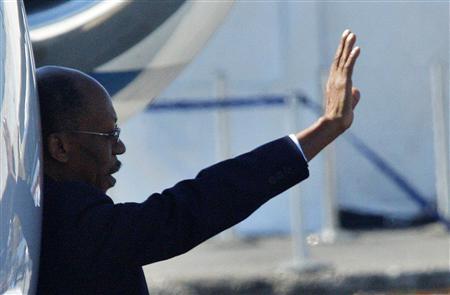Champion of Poor - reviled by elite: Aristide Returns to Haiti
/
Haiti's former president Jean-Bertrand Aristide waves upon his arrival at the international airport in Port-au- Prince, March 18, 2011.
From [HERE]and [HERE] Former President Jean-Bertrand Aristide made a triumphant homecoming to Haiti on Friday after seven years of exile, returning despite U.S. objections two days before a crucial presidential vote.
Thousands of enthusiastic followers turned out to greet the former leader, who is still widely revered in impoverished Haiti as a champion of the poor, although viewed by the United States as divisive figure who could disrupt Sunday's election. Supporters whooped and cheered at Port-au-Prince airport as a smiling Aristide, accompanied by his family and actor and black rights activist Danny Glover, emerged from the charter plane that brought him home from South Africa.
"If you could lean against my heart you could hear how fast it is beating, how it is singing a melody to Haiti," Aristide, wearing a blue suit, told reporters at the airport.
Some random facts about Aristide courtesy of Reuters:
* As a Roman Catholic priest and proponent of liberation theology -- which holds that religion should be used to press for social and political change -- Aristide gained prominence as a champion of the poor in the mid-1980s who dared to speak out against Jean-Claude "Baby Doc" Duvalier, son and successor of the late feared dictator Francois "Papa Doc" Duvalier. The younger Duvalier fled Haiti during a popular revolt in 1986.
* Soft-spoken in person, but a fiery orator from the pulpit, Aristide's political activism and populism won him reproach from church superiors and the Salesian Order expelled him in 1988. He led the National Front for Change and Democracy to a landslide win in the 1990 elections, tapping into widespread popular rejection of years of Duvalierism and becoming Haiti's first freely elected president.
* A 1991 military coup ended his presidency seven months after it started, reflecting the suspicion and hostility with which he was viewed by Haiti's wealthy traditional elite and the army. He was sent into exile and spent three years building support for his return, first in Venezuela and then in Washington, where he hired influential lobbyists.
* Following international sanctions against the military coup leaders and a U.N.-brokered plan for his return, Aristide was finally reinstated in October 1994 through the intervention of a U.S.-led multinational force. One of his legacies was the elimination of the armed forces as an institution in Haiti.
* Constitutionally barred from seeking a second consecutive term, he left office in early 1996 and was succeeded by Rene Preval. Aristide soon grew disenchanted, formed a new political party and contested the 2000 presidential election under the promise of "peace in the head, peace in the stomach." He won but the vote was boycotted by much of the opposition and results were generally seen as fraudulent by many in the international community.
* Aristide's second presidency was marked by economic instability that led to street protests and a violent rebellion that toppled his government in 2004. He went into exile again -- this time to South Africa in a deal negotiated by the United States and Haiti's former colonial ruler, France. Aristide accused Washington of removing him from power, describing his flight out of Haiti on a U.S. plane as a "kidnapping."
* His aides have said he will not involve himself in politics, focusing only on education. But in his first comments after stepping off the charter jet that returned him from exile in South Africa, Aristide did mention that his Fanmi Lavalas political party, Haiti's biggest, was barred from registering its own candidate for Haiti's elections.






























































































































































































































































































